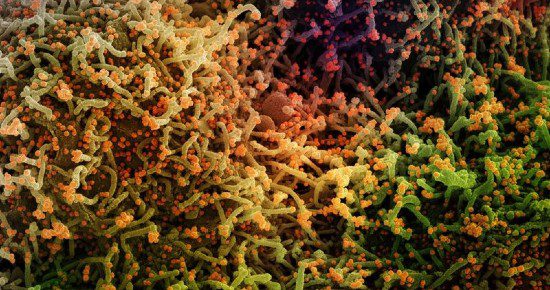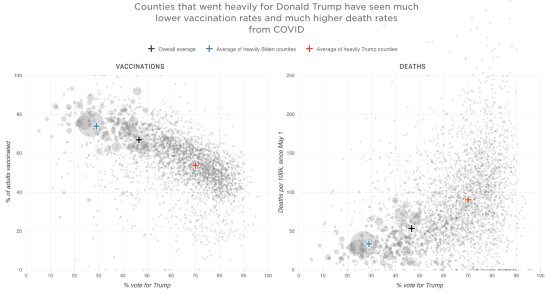Here’s a post from 10+ years ago about the insufficiency of facts for persuading those whose identity-defining choices cannot account for or accommodate those facts.
The subject then was climate change. The proximate cause for this post was NASA’s fine ca. 2010 web portal compiling and presenting the overwhelming evidence demonstrating that climate change is, in fact, a fact — a real thing the reality of which is not contingent on our “belief” therein. Hence the title of the original post: “Climate change facts, for what that’s worth.”
That discussion seems urgently relevant today as we struggle with a pandemic that remains uncontrollable thanks to millions of our neighbors who proudly defy reality and refuse to care about facts. So I’ve adapted the original post below, changing references to one form of grievously consequential fact-rejection to the more recent example of that same phenomenon. Let’s see if that holds up.
[This site provides] just the sort of single, comprehensive, and accessible presentation of the evidence that is needed to persuade [COVID] denialists who may be misinformed.
The problem, though, is that most such denialists are not simply or sincerely misinformed. Most of them aren’t looking for, or open to, or concerned about the facts of the matter.
The facts of the matter do matter to those for whom facts matter, but what of those for whom they don’t? The … site is conclusive. It presents facts that are demonstrably and undeniably true. Yet those facts are, for many, unpersuasive. How is that possible?
The specifics of [the pandemic] — this set of facts and the response they require and the consequences of failing to respond — are terribly important in particular, but this same bizarre phenomenon of facts not being persuasive is also terribly important in general. Fill a jury box with people who are unpersuaded by facts and killers will be set free while the innocent are imprisoned. Those who are impervious to facts will perpetrate similar injustices in the voting booth.
Telling the truth is a duty. It is the first duty we owe to the truth itself and to every neighbor we meet who is trapped in a lie. Facts matter.
But do not always expect facts to convince.
Someone who has arrived at their current stance due to something other than facts will not likely be persuaded to budge from it due to the facts. Some small percentage, some few, are honestly misinformed, and for them facts and information will be persuasive and liberating. They will be grateful for the website.
But for most the problem is not simply one of a lack of accurate information. For them, finding their way back to the truth will require retracing the steps that led them away from it — a path that had little to do with information or facts.
Regarding the facts of [the pandemic] — and also any other similarly oft-rejected set of facts that cannot reasonably be denied — the denialists can be grouped into three broad categories: 1. The honestly uninformed or misinformed; 2. The liars; and, 3. The deluded.
The facts presented on that website will be persuasive to those who fall into the first category. For them, a clear presentation of accurate facts will be necessary and sufficient.
For those who fall in the latter two categories, a clear presentation of accurate facts will be necessary, but it will not be sufficient.
Those in the second category, the liars, most likely already know the facts. They’re simply opposed to them for other reasons — usually money. Sometimes it’s a staggering amount of money, but sometimes they’ve agreed to oppose the facts for a much more modest sum. And sometimes the liars are motivated by little more than the chance to be in proximity to money — as in the case of some of the current candidates for public office who have declared themselves deniers of the facts. But while the amounts may vary, the motive is the same (“We’ve established that madam, now we’re haggling over price”).
I suppose we could list power as another motive for those in this second category, but that leads to a chicken-and-egg question. Generally speaking, those who lie in pursuit of power view that power as a means of securing money and those who lie in pursuit of money view that money as a means of securing power. In most cases I doubt whether even they can be sure which is which.
The third category is the most diverse and most interesting. I’ve employed the passive voice there — “deluded” — because that is what those in this category have in common. They are deluded, yet the cause or source of their delusion varies greatly.
There are a host of different cognitive frameworks and strategies for denying undeniable facts. In general, most of these involve some model or construct — religious, superstitious, ideological, economic, academic, conspiratorial — that cannot adapt to unwelcome facts and thus provides various mechanisms for avoiding or denying them. Some of these mechanisms can be quite effective, but none is wholly automatic. They all require effort that cannot be wholly unconscious. They all require, in other words, that the deluded play a somewhat active role in their own delusion.
It’s usually helpful to identify which model or construct you’re dealing with when trying to free someone from this form of bondage, but that shouldn’t be your main point. You don’t need to tailor the facts to accommodate their ideology or framework — the point is that their ideology or framework will have to accommodate the facts.
Those facts are not, in themselves, an assault on any such ideology or framework. The facts don’t care about any of that. It may be helpful to point this out, to remind those in this category that they are not being asked, or forced, to defend their framework, only to account for and accommodate a stubbornly fact-ish fact that exists wholly independent of their theory or faith or ideology.
Some of what I’m lumping together here may not seem substantial enough to fit the term “ideology.” The deluding ideology may be something as visceral and simple as “I intensely dislike [Anthony Fauci]” or it may be little more than an expression of the common human tendency to try to avoid thinking about unpleasant and difficult things.
One such “ideology” or framework that I’m convinced plays a large role in American [COVID]-denialism is the quasi-religious desire to believe that harmful consequences can only result from deliberately malicious actions. If [the pandemic] were shown to be the work of a clearly identifiable villain — something more along the lines of the pollution narratives of A Civil Action or Erin Brockovich — then they might be more receptive to the idea. But they cannot accommodate facts that suggest the possibility of calamity due to the aggregate effects of billions of mostly innocent decisions.
This particular delusional framework defends itself aggressively because a great deal is at stake for those who subscribe to it. If the 1-to-1 link between harmful consequences and deliberate malice is allowed to be questioned, then they might not be immortal after all.












